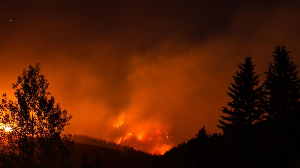Growing up in Colorado, whose tagline adorns the signs at the state line—Welcome to Colorful Colorado!—we were proud that the words of the song America the Beautiful were written by Katharine Lee Bates, who spent the summer of 1893 teaching at Colorado College and was poetically inspired by a trip up Pikes Peak outside of Colorado Springs. 
These days, the "purple mountain majesties" might be well be more of an orange glow of forest fires, which—long suppressed and amped up by human impacts to ecosystems and the climate system—have roared back with devastating effects in recent years. Much of central Colorado, especially the Front Range near the urban corridor north and south of Denver, is projected with a one degree Celsius (1.8 degree F) increase to have a sixfold increase of wildfires in the mountains and a nearly fourfold increase in the prarie grasslands and urban forests of the metropolitan areas.
Colorado is politically a purple state, fairly evenly balanced between blue Democrats, mostly in Denver/Boulder and ski towns, and red Republicans in rural areas and Colorado Springs, with a mix of independent-minded, Libertarian-leaning swing voters scattered throughout the state. While the Governor and state legislature are now in Democratic hands, President Obama, while winning over Mitt Romney in the 2012 election, received fewer votes than the ballot measure legalizing recreational use of marijuana.
As a classic purple swing state because of its mix, Colorado was an attractive case study for Anthony Leiserowitz and his colleages at the Yale Project on Climate Change Communications to study Climate Change in the Coloradan Mind, funded by Skoll Global Threats and the Energy Foundation. The findings are another confirmation that, as Leiserowitz has written before in his study of peoples' knowledge about climate change, most people are confused about the causes and effects of climate change, never having had a formal course in climate change, relying instead on bits and pieces of (sometimes conflicting) information to form an uninformed opinion.
A few highlights of the study:
- Most Coloradans (70%) believe global warming is happening; most say the issue is very or somewhat important to them (73%).
- Two thirds think that their local government should be doing more to prepare for the potential impacts of global warming, and an equal number say that switching from fossil fuels to renewable energy would either increase economic growth and jobs in the state (52%) or at least make no difference (14%).
- About half are very or somewhat worried about climate change, believe it is caused mostly by human activities, and say they have personally seen its impact (increased severity of wildfires, droughts, reduced snowpack, and heat waves).
Spurred by drought, wildfires, and local action plans anticipating response to more severe impacts, there is general but shallow awareness of climate change in Colorado, as there is in many parts of the nation. A contributing factor: the lack of integrated coverage of climate and energy issues in schools, which nearly one in four people attend in any given year.
Six years ago, Sarah Wise, then a colleague at CIRES Education & Outreach, conducted a study published in the Journal of Geoscience Education under the title "Climate Change in the Classroom: Patterns, Motivations, and Barriers to Instruction Among Colorado Science Teachers." She found that most teachers, if they covered climate change at all, only discussed the topic informally. Misconceptions about the topic were widespread among teachers. Particularly worrisome was the prevalence of the belief that "both sides" of the (supposed) controversy over causes of climate change should be presented to students—even though there is not real scientific "controversy" on whether humans are altering the climate and the rest of the Earth system.
It isn't clear to me what use the data from this survey are for those intent on making political hay and pushing for climate action, but who aren't interested in investing in building the true capacity of people to make informed decisions through education. A learning community around climate requires both knowledge and inspiration. As someone once suggested, faith without works, without action, is dead. To walk the talk, we first need to learn how to walk...and right now, bumbling along with no real climate and energy literacy foundation to make informed decisions, we're still crawling.
Timelapse and photo by Matt Johnson
